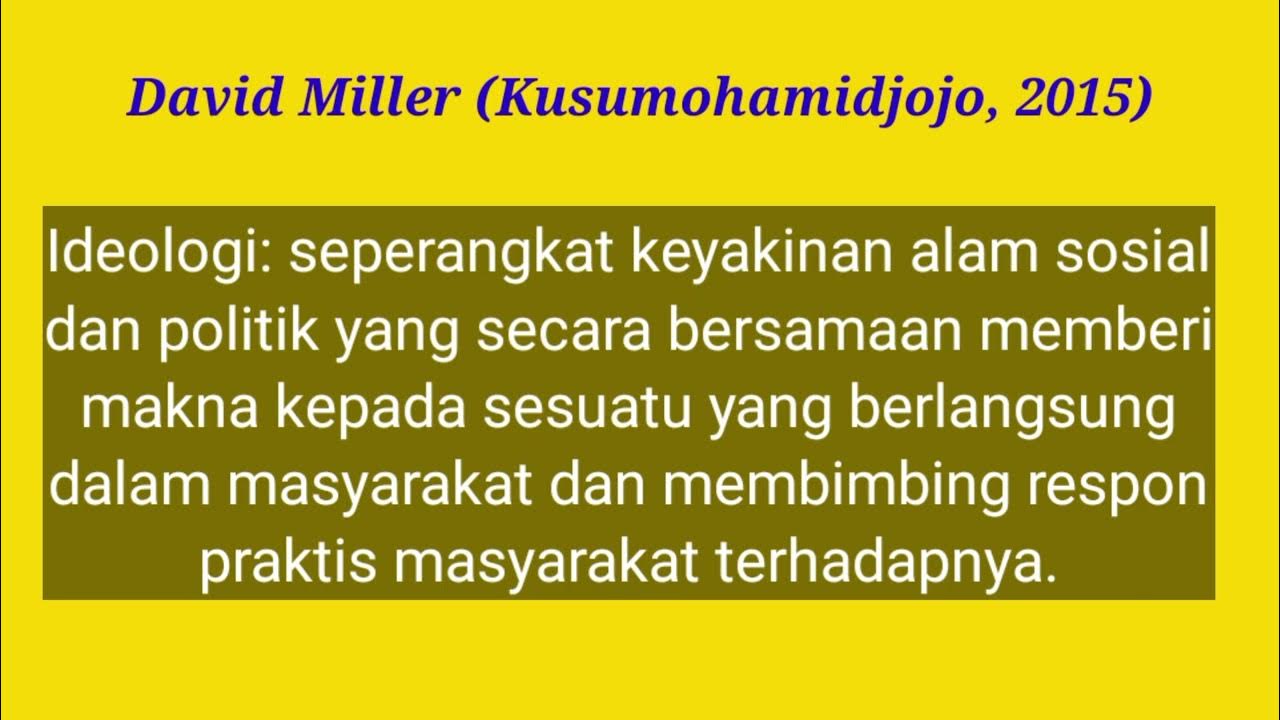Political Ideology: What is Ideology?
Summary
TLDRThis video script delves into the concept of political ideology, tracing its origins from the French Revolution to modern interpretations. It outlines the core components of an ideology, including the explanation of political phenomena, moral criteria, orientation of adherents, and political programs. The script promises a historical exploration of ideologies, focusing initially on Western political thought and its global impact, with plans to later examine non-Western ideologies and influential thinkers' contributions to political philosophy.
Takeaways
- 📚 The term 'political ideology' originated during the French Revolution, initially as the 'science of ideas' for social and political improvement.
- 🔄 The concept of ideology was later inverted in Marxist thought to represent the self-justification of those in power.
- 🤔 Modern understanding of political ideology is complex and varies greatly between theorists and practitioners.
- 💡 Political ideology today is generally broken down into four parts: explanation of political phenomena, moral criteria, orientation of adherents, and a political program.
- 🌍 The script emphasizes the need to understand political ideology within the context of mass movements and personal political philosophies.
- 📈 The analysis of political ideology will trace a timeline starting from the late 18th and early 19th centuries, focusing on Western political ideology due to its global influence.
- 🌐 The series will also explore ideologies of non-Western societies, acknowledging the impact of Western political systems on other cultures.
- 👤 Discussion of historical figures who were both thinkers and leaders is inevitable, offering insights into their political theories and implementations.
- 🔑 Key concepts such as 'freedom' and 'democracy' will be examined for their implications and interpretations across different ideologies.
- 📊 The differentiation between 'left-wing' and 'right-wing' political classifications will be a starting point for the series on political ideology.
- 🎥 The video promises to cover a broad range of topics, beginning with the next episode focusing on political classifications.
Q & A
What is the origin of the term 'political ideology'?
-The term 'political ideology' originated during the French Revolution and was initially posited as the science of ideas with the main goal of social and political improvement.
How was the term 'political ideology' used in Marxist thought?
-In Marxist thought, the term 'political ideology' was radically reversed to be specifically about the self-justification of governing powers.
What are the constituent parts of political ideology as understood today?
-Political ideology today can generally be broken down into explanation and interpretation of current political phenomena, moral criteria for the evaluation of political concepts, orientation of adherents in regard to their role in the world, and a political program to outline the political future.
What is the immediate aim of the communists according to the script?
-The immediate aim of the communists is the conquest of political power by the proletariat.
How does the script describe the relationship between political ideology and its predecessors?
-Every political ideology is to some degree the synthesis of its predecessors and its various advocates into a common denominator.
What timeline will the series on political ideology focus on initially?
-The series will initially focus on the origins of Western political ideology, beginning around the revolutionary era of the late 18th and early 19th century.
Why does the series initially focus on Western political ideology?
-The Western system of government and politics came through the age of imperialism and colonialism to decisively influence virtually all parts of the world, overriding or amending pre-existing political thought in other parts of the globe.
Will the series on political ideology also study ideologies of non-Western societies?
-Yes, the series will at a later stage also study specifically some ideologies of non-Western societies.
What key concepts will the series discuss in relation to political ideology?
-The series will discuss the implications and different interpretations of various key concepts such as freedom and democracy.
What differentiation will the next episode of the series start with?
-The next episode will start with political classifications and especially the differentiation between left-wing and right-wing ideologies.
What historical figures will the series inevitably discuss due to their personal political philosophies?
-The series will inevitably discuss figures like Rousseau, Locke, Hopp, Burke, Smith, Mill, Marx, Gentile, and others, as well as historical figures who doubled as thinkers and leaders like Napoleon, Lenin, Mao, and Mussolini.
Outlines

このセクションは有料ユーザー限定です。 アクセスするには、アップグレードをお願いします。
今すぐアップグレードMindmap

このセクションは有料ユーザー限定です。 アクセスするには、アップグレードをお願いします。
今すぐアップグレードKeywords

このセクションは有料ユーザー限定です。 アクセスするには、アップグレードをお願いします。
今すぐアップグレードHighlights

このセクションは有料ユーザー限定です。 アクセスするには、アップグレードをお願いします。
今すぐアップグレードTranscripts

このセクションは有料ユーザー限定です。 アクセスするには、アップグレードをお願いします。
今すぐアップグレード関連動画をさらに表示

Historia de las medidas - En su justa medida

matematica pra que

Cultural and Sociopolitical Evolution - Understanding Culture, Society and Politics | Galaxy

Historiography of The French Revolution - II

Bab 1. Pancasila, Sub. A. Makna dan Hakikat Ideologi..(Kls XI/1)

Was the Terror an inevitable outcome of the French Revolution? | Dr Robert Priest
5.0 / 5 (0 votes)
